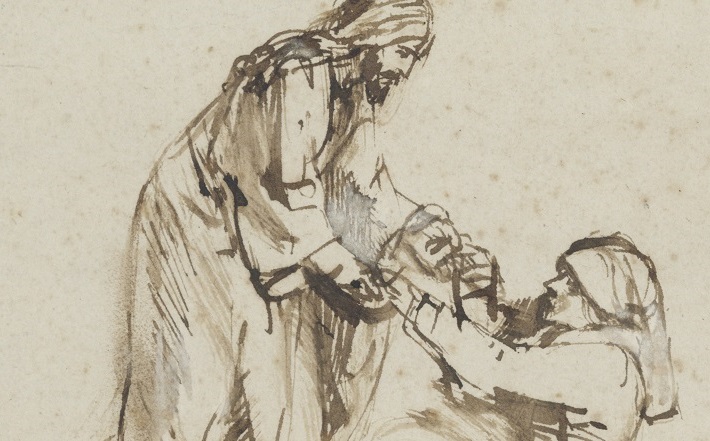Commentary on 1 Corinthians 9:16-23
Paul’s apostleship was a distinctive one. This Jew firmly believed he was sent to proclaim the good news to gentiles. Both Paul himself and Acts tell us that he visited Jerusalem to seek the support of the leaders there (Galatians 2:1–10, Acts 15:1–35; Paul would be upset if we called it approval) for his gentile mission. Yet he had no direct ties with any of them or any of Jesus’ firsthand disciples. He had not encountered the historical Jesus. Instead, his apostleship depended largely on his success in founding communities and maintaining good relationships with them. Letter-writing was one of the crucial ways he stayed in touch with those churches.
The Corinthian correspondence shows that Paul’s apostleship was a somewhat precarious one. Paul and the Corinthians exchanged several letters over some period of time (2 Corinthians is a collection of multiple letters). Their relationship had ups and downs, and Paul’s apostolic authority was one of the reasons. After he wrote 1 Corinthians and made his second visit to Corinth, and after other apostles visited Corinth, some Corinthians complained about Paul, saying, “His letters are weighty and strong, but his bodily presence is weak, and his speech contemptible” (2 Corinthians 10:10).
We do not know what led Paul to discuss his apostleship in 1 Corinthians 9; he still seems to speak as a trustworthy adviser in this first letter. Paul presents his own defense to those who want to examine him (verse 3) and wants the Corinthians to know that their church, nothing else, is the proof of his apostleship. He writes: “If I am not an apostle to others, at least I am to you; for you are the seal of my apostleship in the Lord” (verse 2). His apostleship does not require any other endorsement than his work of the proclamation of the good news.
The rest of 1 Corinthians 9, including the lesson for today, develops his pleadings. What does the proclamation of the gospel entail? Paul argues that, first and foremost, proclaiming the good news means being less concerned about rights and more focused on the call. In 9:3–7, Paul distinguishes himself from other apostles, including Cephas and the brothers of Jesus, who seemingly enjoyed certain rights. Those rights are the right to their food and drink, the right to be accompanied by a wife, and most importantly, the right to refrain from working for a living (verses 4–6). He and his companions could also claim those rights but would not because he does not want to “put an obstacle in the way of the gospel of Christ” (verse 12).
The Greek word for “right” here is exousia, which the New Revised Standard Version translates as “liberty” in the previous chapter (8:7). So Paul’s message on careful and thoughtful use of exousia resonates also in this chapter. Here, Paul believes that exercising exousia in order to be self-sufficient is a better way to follow Jesus’ command: “Those who proclaim the gospel should get their living by the gospel” (verse 14). It is this call that determines his apostleship.
In the same light, proclaiming the good news comes with no reward. By reward, Paul means wage (verse 17; the New Revised Standard Version Updated Edition translates it as “wage”). Paul makes it clear he does not expect any wage from his work for the gospel. Why? Because he is obliged to proclaim the good news. There will be misery if he does not preach the good news (verse 16b). It might be surprising that he does not view apostleship as a voluntary vocation. But this is to amplify that his apostleship is what he is called to, not what he chose. It looks like Paul did not receive any financial support from the Corinthians; instead, he asks for the collection for the believers in Jerusalem (16:1–4).
Interestingly, Paul sometimes did receive financial support for his ministry, particularly from the believers in Philippi (Philippians 4:15–18; 2 Corinthians 11:8–9). Yet, he was extremely cautious about monetary gifts from the Corinthian church, possibly because some Corinthians understood such support as compensation. Paul teaches the Corinthians not to associate spiritual things Paul and his companions sowed with fleshly things (verse 11). He does not seek a reward for the work he is obliged to do. It is this obligation that sets apart his apostleship.
Lastly, proclaiming the good news involves contextualization. In 9:19–23, Paul calls himself an apostle free from all. Basically, he is a free agent with no supervisor to report to or company to work exclusively for, other than the Christ who called him. Paul continues to write that this freedom allows him to be enslaved to all (verse 19). This description, like his self-identification as a slave of Christ (Romans 1:1), is problematic rhetoric since Paul was freeborn. It can be best understood as an expression of self-emptiness.
The following verses show how he engages with different groups for the sake of the gospel. To the Jews, he proclaims as a Jew; to those outside the law, he proclaims as one outside the law; to the weak, he proclaims as a weak person (verses 20–22). He adapts himself to each context because the gospel is never one-size-fits-all. Contextuality is not to bend the gospel to fit different cultures but to respect diversity among all of God’s creation. The gospel is open and inviting in order that more people will respond to it. As one called to preach the good news to more, Paul is required to become “all things to all people” (verse 22). It is this fluidity that characterizes his apostleship.
Apostleship is manifested in many different forms of mission and evangelism today. Whatever one is called to do for the sake of the good news, this passage reminds us that proclaiming the gospel brings us moments of self-examination, at which we are faced with vulnerabilities. As we prepare ourselves for Lent, this reminder may lead us to a time of deeper reflection.


February 4, 2024